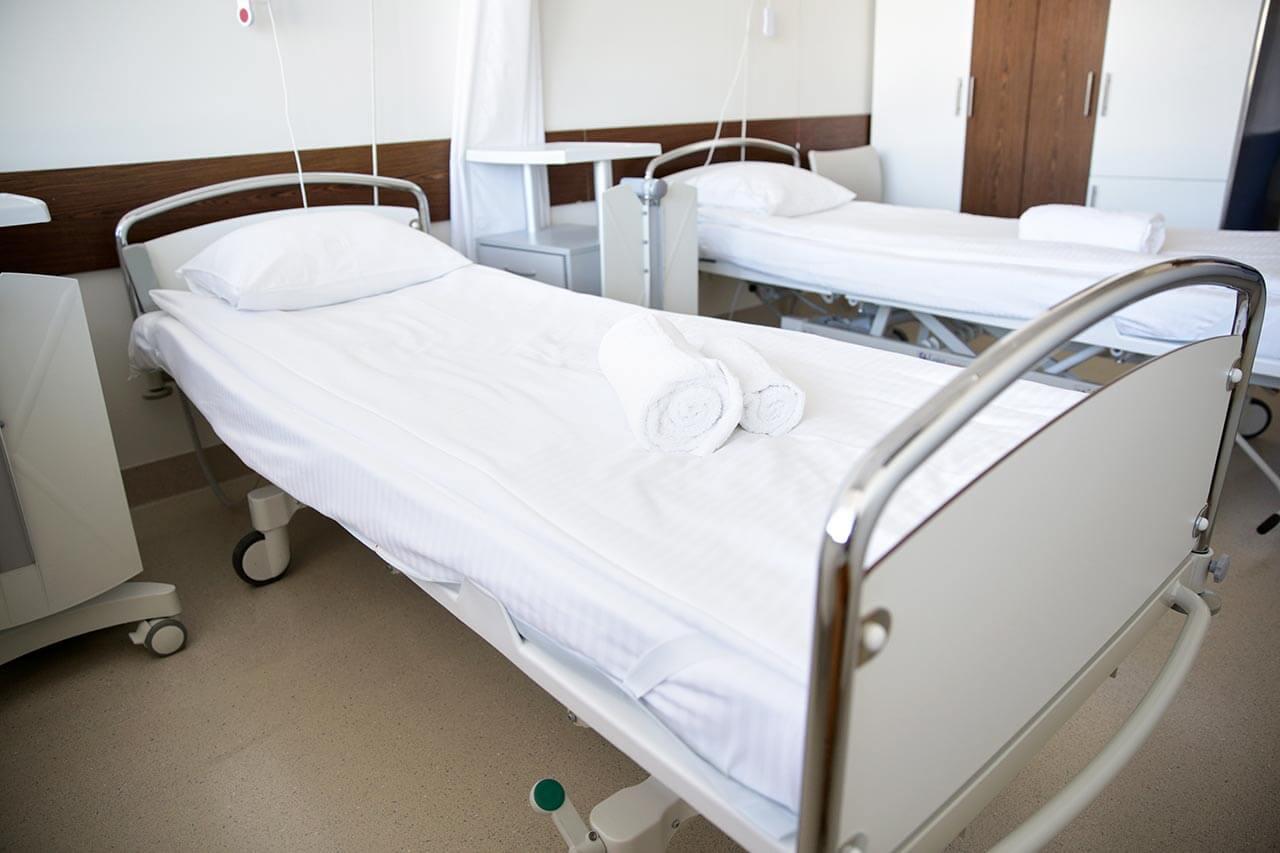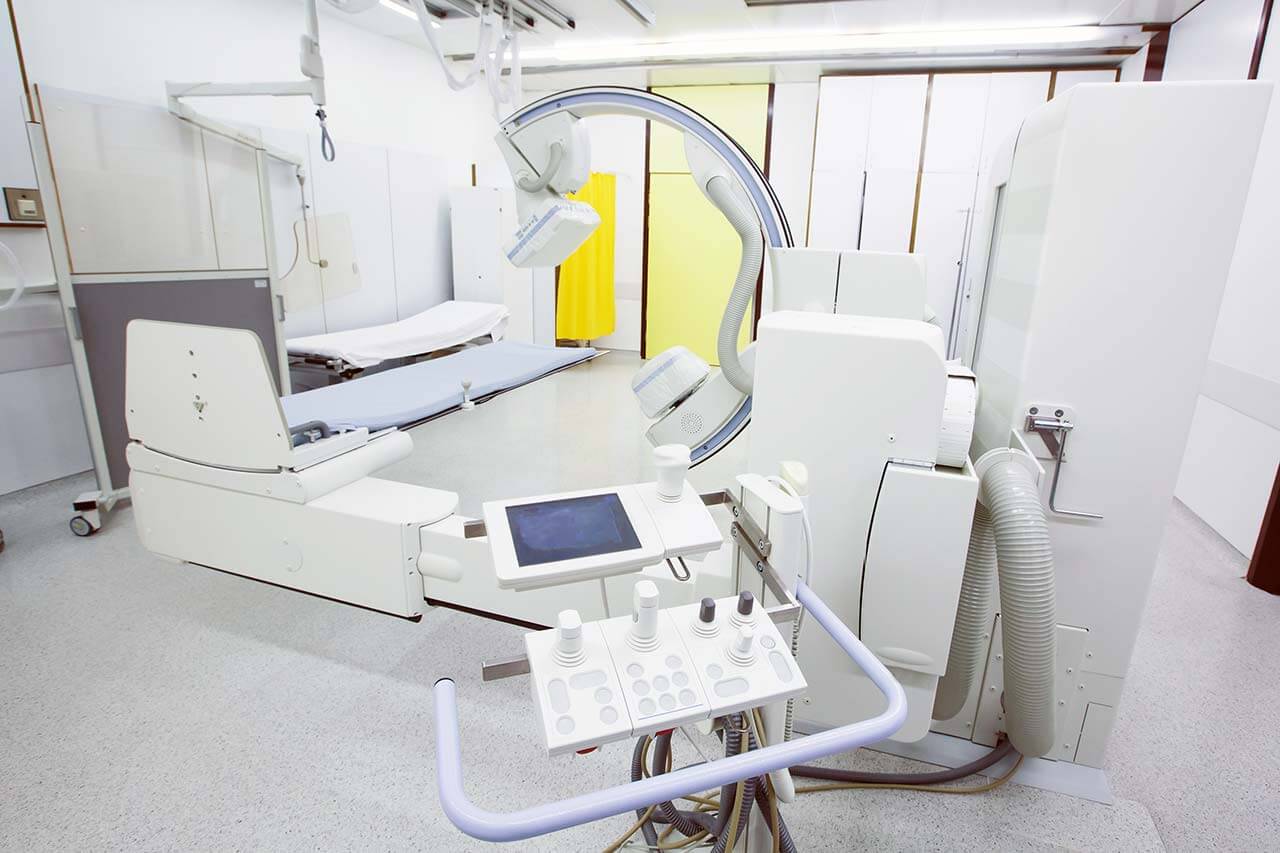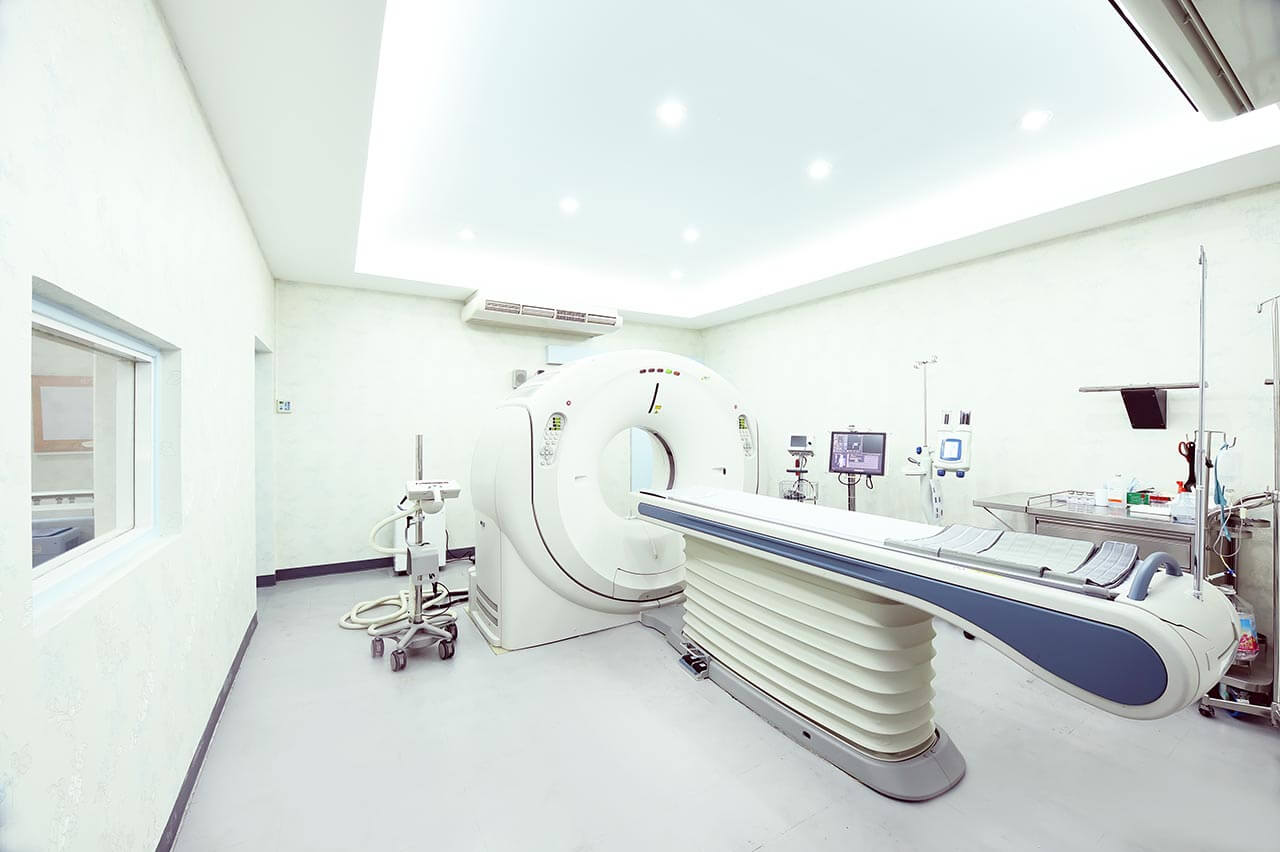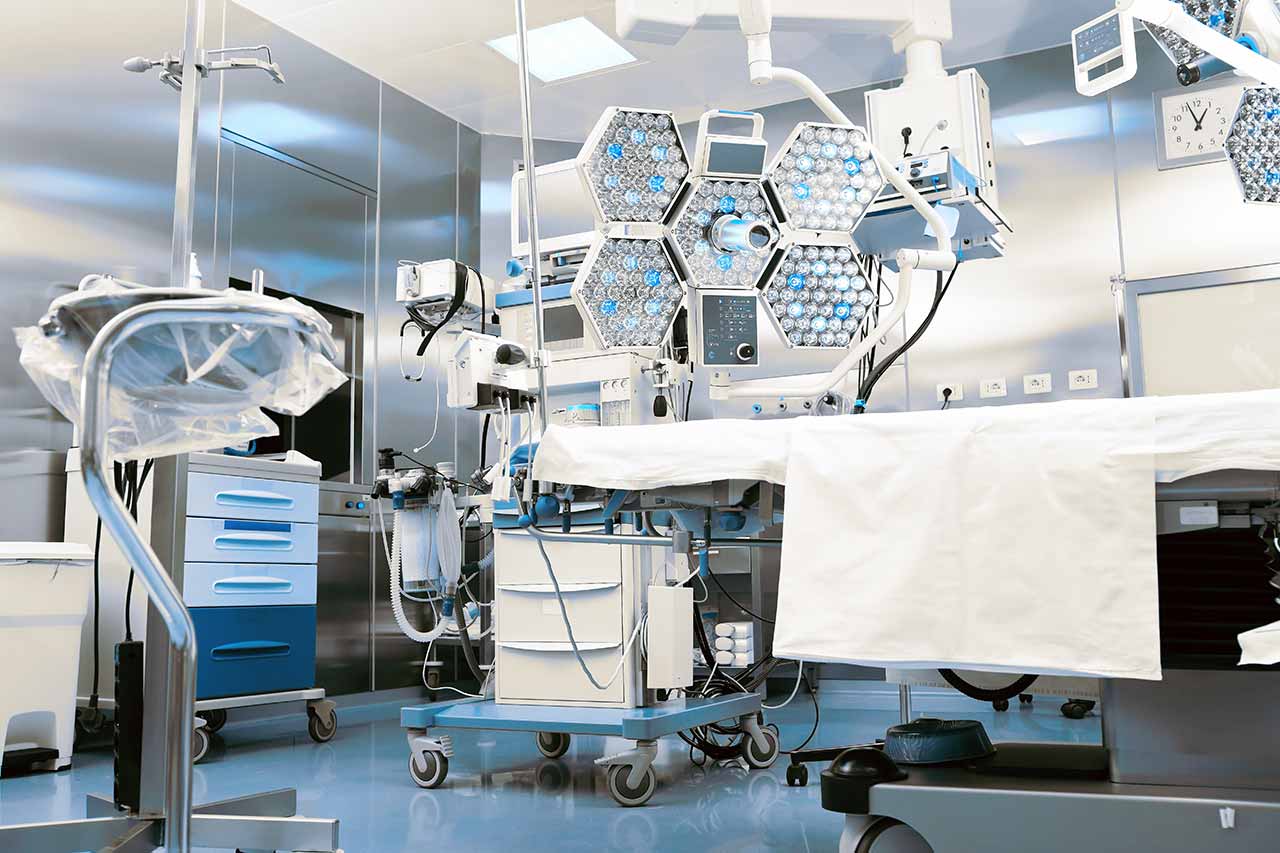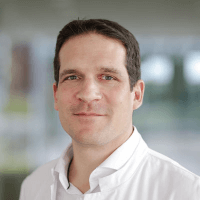
The program includes:
- Initial presentation in the clinic
- clinical history taking
- physical examination
- laboratory tests:
- complete blood count
- biochemical analysis of blood
- tumor markers
- CT/MRI of the chest (on indication 650/1200€)
- ultrasound and x-ray of the chest
- nursing services
- consultation of related specialists
- treatment of the chief physician and all leading experts
- development of individual treatment plan
Required documents
- Medical records
- Chest MRI/CT scan (not older than 3 months)
- Biopsy results (if available)
Service
You may also book:
 BookingHealth Price from:
BookingHealth Price from:
About the department
The Department of Adult and Pediatric Thoracic Surgery, Thoracic Endoscopy at the University Hospital Essen offers the full range of modern diagnostic and therapeutic services in these fields. The department performs more than 2,300 interventions annually, so it is one of the largest and most important medical facilities in Germany and Europe. The surgical options include both open surgery and sparing minimally invasive endoscopic procedures. Special attention is paid to the treatment of lung cancer and lung metastasis from other tumors. The department is headed by Prof. Dr. med. Clemens Aigner.
The department's medical team applies all the proven modern methods of diagnostics and surgical treatment of thoracic diseases. More than 1,200 open thoracic surgeries and about 1,000 minimally invasive endoscopic interventions are performed here annually. Over 80% of patients received surgical treatment of malignant tumors, such as lung cancer or lung metastases. In addition to inpatient treatment, the department provides services for the outpatients (about 2,000 cases annually).
Since November 2014, the department's surgeons have performed many interventions using the da Vinci surgical system. Of course, the surgical intervention is not carried out by the robot. The da Vinci system acts as a highly accurate instrument and its work is completely controlled by the surgeon.
The priority focus of the department's clinical practice is thoracic cancer surgery. All decisions on the diagnostics and treatment of malignant diseases of the lungs, bronchi, pleura and mediastinum are made taking into account the stage, size, type of tumor, localization, cardiovascular risk and age of the patient. The treatment strategy is developed in interdisciplinary cooperation with the specialists from related fields. Preference is always given to minimally invasive treatments.
The service range of the department includes the diagnostics and treatment of the following thoracic diseases in adults and children:
- Congenital diseases of the lungs and mediastinum
- Tracheal and bronchial malformations
- Congenital lobar emphysema
- Primary and secondary pulmonary hypoplasia
- Extra- and intralobar pulmonary sequestration
- Tracheal and bronchial cysts
- Congenital cystic adenomatoid malformations
- Agenesis and stenosis of pulmonary artery
- Pulmonary arteriovenous fistulas
- Different types of open and thoracoscopic resections
- Mediastinoscopy, thoracoscopy and minimally invasive surgery
- Benign and malignant tumors of the lungs and bronchi
- Surgical treatment of stage I-IIIA bronchogenic cancer
- Multimodal therapy with preoperative chemotherapy, chemo- / radiation therapy and subsequent surgery at the stage IIIA and IIIB and in some cases at IV stage (in collaboration with oncologists and radiation therapists)
- Surgical interventions in elderly patients
- Surgical treatment of single and multiple lung metastases (for example, in kidney, intestinal, breast cancer, etc.), also within the multimodal therapy
- Mediastinoscopy and imaging-guided thoracoscopy in bronchial carcinoma
- Video-assisted surgery for atypical lung resection and lobectomy
- Special surgical treatment of bronchogenic cancer
- Extended surgical intervention with the resection of large vessels, thoracic wall, pericardium and diaphragm, extended resections of pancoast tumors
- Sternotomy
- Unilateral or bilateral thoracotomy
- Laser resection (surgery for metastases)
- Robot-assisted surgery (in some cases)
- Mediastinal diseases
- Benign and malignant thymic tumors (thymoma, thymic cysts, thymic carcinoma)
- Myasthenia gravis
- Teratomas and lymphomas (as part of multimodal therapy)
- Neurogenic tumors, mesenchymal tumors and mediastinal cysts
- Benign esophageal diseases (fibroids, cysts, diverticula)
- Superior vena cava syndrome
- Mediastinal infections (acute and chronic mediastinitis, mediastinal fibrosis)
- Hyperhidrosis (with damage to the face, hands, underarms)
- Sternotomy
- Thoracotomy
- Mediastinoscopy and video-assisted interventions
- Video-assisted mediastinal lymphadenectomy
- Minimally invasive video-assisted thymus resection
- Minimally invasive sympathectomy
- Robotic surgery (in some cases)
- Tumors and malformations of the thoracic wall
- Primary benign and malignant tumors of the thoracic wall (lipomas, chondromas, fibroids, sarcomas, lymphomas)
- Thoracic wall metastases (carcinomas, sarcomas)
- Infiltration of the thoracic wall with lung, thoracic and pleural tumors (including pancoast tumors)
- Infections of the ribs and sternum
- Thoracic deformities (pectus excavatum, pectus carinatum, etc.)
- Thorax resection with and without subsequent plastic surgery (if necessary, in collaboration with plastic surgeons)
- Resection and replacement of the thoracic wall / sternum with alloplastic materials with various types of muscle reconstruction
- Minimally invasive interventions for pectus excavatum correction (for example, Nuss, Ravitch procedures and combined techniques)
- Other types of correction and stabilization of thoracic wall defects
- Pleural diseases
- Pneumothorax (primary, secondary, traumatic)
- Benign and malignant pleural effusion
- Parapneumonic and postoperative empyema
- Pleural infections (tuberculosis, fungal infections)
- Chylothorax
- Benign pleural tumors
- Malignant diffuse pleural mesothelioma
- Diagnostic and therapeutic minimally invasive video-assisted procedures
- Open pleurectomy and decortication
- Expanded pleuropneumonectomy with the resection of pericardium and diaphragm (3-PD resection) in pleural mesothelioma
- Diaphragm diseases
- Diaphragmatic paralysis, elevated hemidiaphragm
- Congenital and acquired diaphragmatic hernia
- Tumors of the diaphragm
- Video-assisted and open diaphragm resections
- Diaphragmatic hernia repair
- Infectious lung diseases
- Chronic pneumonia, lung abscess
- Parapneumonic and postoperative empyema
- Middle lobe syndrome, bronchiectasis
- Complications of tuberculosis
- Aspergilloma, other fungal infections
- Pulmonary cystic echinococcosis
- Thoracoscopic resection in empyema
- Decortication, thoracostomy, thoracic and muscular plastic surgery
- Transpericardial and transpleural surgery in bronchus stump insufficiency
- Pulmonary emphysema
- Pulmonary cysts
- Bullous changes
- Pulmonary emphysema in chronic obstructive pulmonary disease
- Bullectomy
- Lung volume reduction surgery, unilateral and bilateral, open and video-assisted
- Participation in clinical trials of new treatment methods
- Tracheal diseases
- Congenital and acquired tracheal diseases
- Benign strictures and stenoses (after injuries, intubation and artificial ventilation)
- Primary and secondary tracheal tumors
- Benign and malignant tracheoesophageal fistula
- Iatrogenic tracheal injuries
- Treatment of acute tracheal injuries (endoscopic and open surgery)
- Simple and advanced tracheal resections, reconstructive interventions
- Resection and closure of benign tracheoesophageal fistulas
- Interventional measures, such as dilatation, tracheal and esophageal stent implantation, bougienage, laser therapy
- All types of stent implantation
- Open and endoluminal methods of suturing in tracheal injuries
- Other medical services
Curriculum vitae
Education and Professional Career
- 1994 - 2000 Study of Medicine at the University of Vienna, Austria.
- 2000 Admission to medical practice (in Germany 2015).
- 01.2000 Doctoral thesis defense, University of Vienna, Austria.
- 2002 - 2003 Rotation (further training), Elizabeth Clinic in Linz, Vienna Heeresspital, Vienna General Hospital.
- 2003 - 2009 Training for a Medical Specialist in Thoracic Surgery, Department of Cardiothoracic Surgery, Medical University of Vienna.
- 2008 Habilitation, Medical University of Vienna.
- 2009 - 2015 Assistant Professor and Senior Physician in the Department of Thoracic Surgery at the Medical University of Vienna.
- Since 2016 Professor in Thoracic Surgery and Head of the Department of Adult and Pediatric Thoracic Surgery, Thoracic Endoscopy at the University Hospital Essen.
Internships Abroad
- Royal Prince Alfred Hospital, Sydney, Australia.
- Chulalongkorn University Hospital, Bangkok, Thailand.
- University Hospital Leuven, Belgium.
- Toronto General Hospital, Canada.
- Rigshospitalet Hospital, Copenhagen, Denmark.
Memberships
- 2011 - 2013 Managing Position, European Society of Thoracic Surgeons.
- European Association for Cardiothoracic Surgery.
- International Association for the Study of Lung Cancer.
- International Society for Heart and Lung Transplantation.
- German Society of Thoracic Surgery.
- Austrian Society of Thoracic Surgery (former President 2015).
- Austrian Societies of Surgery, Oncology, Transplant Surgery and Pulmonology (Board Member, 2014 - 2015).
Photo of the doctor: (c) Universitätsklinikum Essen
About hospital
According to the authoritative Focus magazine the University Hospital Essen ranks among the top German hospitals!
With 27 specialized departments and 24 institutes, the hospital in Germany is a maximum care medical facility. The hospital has 1,300 beds for inpatient treatment. A highly qualified medical team of more than 6,000 employees takes care of the health of patients. All the specialists give preference to an interdisciplinary medical care, which guarantees a comprehensive treatment taking into account the smallest aspects of a particular pathology. The hospital annually diagnoses and treats more than 50,000 inpatients and about 195,000 outpatients, which testifies to the prestige of the medical institution and the highest quality of treatment in Germany.
The hospital presents all the modern medical fields. Nevertheless, special attention should be given to the following major fields of specialization as oncology, transplantology and cardiology, as well as research activities in the field of immunology, infectology and translational examinations of pathologies of the nervous system and behavioral disorders.
Established on the basis of the standard American model of Comprehensive Cancer Centers, the West German Cancer Center (WTZ) in Essen was recognized as the best medical facility of this kind in Germany in 2009. Nowadays, the center holds leading positions both on the national and international medical markets. The basis of its successful clinical practice is the use of very latest treatment methods and an interdisciplinary approach to each clinical case. The West German Organ Transplant Centre (WZO) is also recognized as one of the best in the country and one of the few in Germany, which specializes in the transplantation of all vital organs, such as kidney, liver, pancreas, heart and lungs. Special attention is paid to kidney and liver transplantation.
The hospital in Germany is proud of its high-tech medical equipment, experienced and competent staff, productive research activities, which allow to guarantee the accurate diagnostics and effective treatment, including rare and very complex clinical cases for every patient. Consequently, the hospital is considered a perfect embodiment of high-quality treatment in Germany.
Photo: (c) depositphotos
Accommodation in hospital
Patients rooms
The patients of the University Hospital Essen live in comfortable rooms designed in bright colors. The standard room furnishing includes an automatically adjustable bed, a bedside table, a personal wardrobe, a personal call button with a built-in light panel, a telephone, a TV and a radio. The Internet access is available at an additional cost.
Meals and Menus
The patients of the hospital are offered a daily choice of three menus. The patients are also offered alternative types of menus, if their religion requires the exclusion of certain foods. If you follow a certain diet or suffer from food intolerance, you will be provided with a menu of your choice by discussing it with your attending physician in advance. The hospital also houses a bistro and a cafe, where one can have a tasty snack, enjoy hot and cold drinks.
Further details
Standard rooms include:
Accompanying person
There are a few types of hotels for the accompanying persons, who want to stay near the hospital. The hotel of the Essen University Hospital offers apartments on the first floor of the nursing high-rise building. The DRK nursing also offers single and double rooms.
The hotel in Grugapark is available for the parents, whose children stay in the hospital. The parents of children with cancer can also stay here. Moreover, The Department of Pediatrics offers its rooms for parents.
